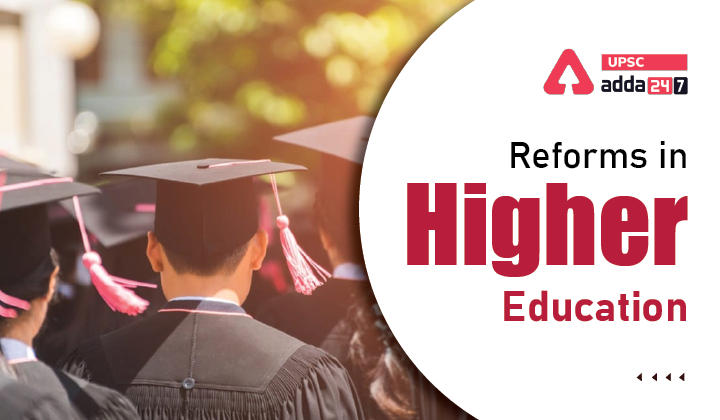Table of Contents
Reforms in Higher Education UPSC: Relevance
- GS 2: Issues relating to development and management of Social Sector/Services relating to Health, Education, Human Resources.
Education in India: Context
- Recently, the Parliamentary Standing Committee on Education, Women, Children, Youth and Sports has made recommendations on reforms in higher education in India.
Reforms in Higher Education: Key points
- The committee has observed that only 30 per cent of the universities and 20 per cent of the colleges are accredited in India.
- The committee recommends that the Government should give an active consideration to the demand that deemed universities be allowed to use the term ‘university’ to avoid confusion abroad as most foreign countries do not use such a nomenclature.
- The proposed Higher Education Commission of India (HECI) will have a vertical on accreditation.
Government steps for higher education
- University Grants Commission has relaxed the norms and standards for setting up open universities. Particularly, land requirement has been reduced from 40 acres to just five acres.
- More universities are being enabled to offer courses in the distance, open and online mode, mostly in collaboration with EdTech start-ups and unicorns.
- Students are also made to complete a certain portion of their course requirements through Massive Open Online Courses.
- Additionally, they can accumulate credits at will and deposit them in their Academic Bank of Credit to be exchanged for a degree at a later stage.
National Education Policy
- 50% GER in Higher Educational Institutions (HEIs) by 2035.
- Academic Bank of Credit to be created to provide multiple entry and exit options for students in Higher education.
- The M.Phil program to be discontinued.
- Multidisciplinary Education & Research University (MERU) to be created.
- By 2040, all HEIs to be multi-disciplinary.
- Over a period of 15-years, all HEIs to become independent and self-governing (ending of affiliation system).
- Higher education institutions to be driven by two missions: Mission Nalanda and Mission Takshashila.
Read current affairs for UPSC





 TSPSC Group 1 Question Paper 2024, Downl...
TSPSC Group 1 Question Paper 2024, Downl...
 TSPSC Group 1 Answer key 2024 Out, Downl...
TSPSC Group 1 Answer key 2024 Out, Downl...
 UPSC Prelims 2024 Question Paper, Downlo...
UPSC Prelims 2024 Question Paper, Downlo...




